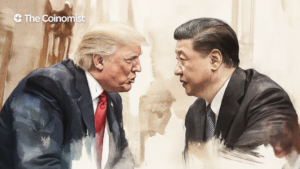Singapore’s Crypto Scene: Where High-Tech Meets Luxury Living

Glass towers shimmer under the tropical sun, yachts idle in turquoise waters, and the hum of innovation fills the air—Singapore is where the crypto elite come to live, build, and belong.
On this page
In Southeast Asia, one city-state leads the charge into the future. Singapore—where digital finance, clean design, and smart tech form the city’s backbone.
Here, innovation doesn’t shout. It works—silently, efficiently.
Why Singapore Is Asia’s Shining Crypto Star
A masterclass in smart urban design, Singapore has quietly built itself into the region’s most desirable crypto destination. With flawless infrastructure and a pro-growth business climate, it’s easy to see why the blockchain elite are calling it home.
Its Web3-adoptive transformation wasn’t accidental—and the reasons are worth exploring.
Check this out: Bloomberg: Singapore Becomes the World’s Leading Digital Hub
1. Laws of the Future
Few places in Asia have embraced the challenge of crypto regulation like Singapore. With the Monetary Authority of Singapore (MAS) at the helm, the city-state has granted licenses to 20 prominent crypto service providers by 2025, including names like Crypto.com, Coinhako, Binance, Robinhood, Luno, and Bitstamp Asia.
These firms have chosen Singapore not just as a home, but as a base of expansion—anchoring their Asian financial operations in a city built for clarity and growth.
Enacted in 2019, the Payment Services Act provides not just rules, but reassurance—ensuring startups can innovate within well-lit regulatory paths. In a world of shifting jurisdictions, Singapore has become a fixed star: a place where startups and investors can navigate with confidence. Binance, Robinhood, Bitstamp Asia и Luno.
2. Infrastructure
Singapore offers one of the most advanced digital infrastructures in the world. With ultra-fast internet, world-class data centers, and widespread renewable energy adoption—solar panels are standard on industrial rooftops—it’s tailor-made for tech founders.
The government has embraced blockchain innovation, welcoming Ethereum scaling projects and cloud mining companies with open arms.
Its Southeast Asian location also gives startups access to a population of over 650 million, positioning Singapore as the ideal launchpad for regional and global growth.

Regulatory Landscape: Cryptocurrency Regulations in Taiwan
3. Culture
Singapore’s culture of innovation is a magnet for the crypto elite. The city’s dynamic startup scene draws engineers and builders from Silicon Valley, China, and Europe, all eager to join the ranks of fast-scaling blockchain ventures.
Notable residents include Ian Balina, founder of Token Metrics, known for his investments and thought leadership in the crypto space. Chiara Zhou, co-founder and CEO of Cega, also frequently works out of Singapore as she expands her influence in DeFi.
Singapore’s crypto ecosystem regularly hosts industry heavyweights. Tim Draper, a venture capitalst, is a frequent guest at local blockchain events. Joe Lubin, co-founder of Ethereum, maintains strong connections with local regulators through his ongoing projects.
Spotted frequently in town are Vitalik Buterin, the ideological force behind Ethereum, and Anatoly Yakovenko, the creator of Solana—turning downtown strolls into impromptu meet-and-greets with crypto royalty.
Combined with strategic investment from firms like Temasek and Sequoia Capital, which have backed several Singapore-based blockchain ventures, this convergence creates fertile ground for accelerated growth.
In Singapore, the old ways of thinking and doing finance are being reimagined, turning the city into a crucible of change.
Related: Singapore Gulf Bank Enters the Stablecoin Market
Singapore Crypto: Beyond Work and into Wonder
Sure, Singapore's crypto scene is next-level. But once you're done with code and coins, step out and explore the city’s wilder side:
- Hit up Marina Bay Sands, where the rooftop park gives you insane views of the skyline.
- Cruise past the Marina Bay docks and check out the mega yachts parked by crypto millionaires.
- Then catch the Spectra Light and Water Show—lasers, beats, fountains… it’s like the metaverse came to life IRL.
- Feet sore from wandering? Trade the pavement for palm-lined shores on Sentosa Island. Whether you're lounging on the beach, racing down the Skyline Luge, or delighting the kids at Universal Studios Singapore, the island delivers a burst of energy and fun.
- For a gentler rhythm, step into the Botanic Gardens, Singapore’s lush sanctuary and a UNESCO World Heritage Site. Here, the National Orchid Garden offers a moment of stillness and bloom—perfect for a quiet, reflective evening.
Craving culture? Head to China Town and Little India, where Singapore’s roots shine through street food and soul. Grab a bowl of han chicken soup with rice or snack on a sizzling masala dosa—then lose yourself in alleyways full of souvenirs, murals, and stories from around the world.

More Regional Advancemets: Singapore Unveils AR Contact Lenses
Singapore Crypto Travel Tips
Singapore crypto is a wild blend of innovation and indulgence—where tech dreams and billionaire lifestyles coexist in style. One thing’s for sure: it won’t just be another stamp in your passport. You’ll come home with unforgettable memories and stories worth retelling.
Just be sure to keep a few things in mind to make your trip smooth—especially if you’re new to Singapore:
- Climate and Clothing
Think heat and humidity—Singapore doesn’t do chilly. With temps sitting at a steady 28–32°C and sticky air to match, you’ll want breezy outfits, wide-brimmed hats, and a good layer of sunscreen.
Rainstorms can roll in without warning, especially between November and January, so keep a foldable umbrella or light raincoat in your day bag. Cool off in one of the many air-conditioned MRT stations or shopping malls—and sip water regularly to keep your energy up.
- Transport
Singapore’s public transport is among the world’s best. The MRT system is sleek, reliable, and inexpensive ($1–$3 per ride), though crowds do swell during commuter hours or major events.
For door-to-door service, Grab is the app to download—expect to pay $20–$30 for city center rides, with potential surges at peak times. Or opt for a more scenic route: rent a bike for $10–$15 a day. It’s eco-friendly, easy to use, and lets you see the city at your own rhythm.
You might be surprised how much you enjoy it.
- Food for Crypto? Here’s the Deal
Hungry in Singapore? Head to a hawker centre—those open-air food halls where locals and tourists grab legit meals without breaking the bank. A solid coffee for $3, a salad for under $12—just don’t expect to pay with crypto everywhere.
Most stalls still stick to cards, but if you’ve got a crypto card linked to your blockchain address, you’re golden. Fancy a splurge? Some upscale restaurants might accept Bitcoin or stablecoins, but check with your waiter first. Just a heads-up: dinner for two can hit $300 fast in the high-end scene.
- Cultural Code
Singapore is famously clean and orderly. Drop trash or chew gum in public, and you could face a fine north of $500—so play it cool and keep things tidy.
Dress modestly for religious spots, skip phone calls on the metro, and be kind in crowds. While English is the go-to, tossing in a terima kasih or trying a little Mandarin shows respect—and locals really appreciate the effort.
- Crypto Security
Singapore feels safe—and mostly is. But when the crowds swell, so do opportunities for theft. Keep your hardware wallet and smartphone close, and don’t skimp on that VPN when making crypto transactions.
You’re not just anywhere—you’re in the Asian crypto capital. That little device you’re holding? People know what it is. And from the app icons on your screen, they might already know what exchange you’re on.

Where to Stay in Singapore: From Frugal to Luxe
Not every trip to Singapore requires five-star spending. In the eclectic district of Geylang, savvy travelers can find budget hotels and hostels priced between $30–$60 a night. It’s not central, but what it lacks in glamour, it makes up for in affordability—and Wi-Fi.
For those seeking balance, Kallang, near the Sports Hub, offers apartments and guest homes from $50–$80 nightly. Though technically on the edge of “Greater Singapore,” both districts provide excellent value for those willing to take a 30–40 minute MRT ride to the heart of the city.
Want to stay where the crypto elite unwind? Marina Bay is your go-to. Starting at $300–$400 a night, hotels here come with floor-to-ceiling views and close proximity to conferences, hackathons, and Web3 networking hotspots.
Craving fashion and flavor? Orchard Road is packed with luxury boutiques, stylish malls, and five-star eats—rooms range from $150–$300 per night. It’s a dream base for anyone chasing the city’s finest shopping and culinary scenes.
If sun-drenched shores and white sails call your name, Sentosa—especially the famed Shangri-La Rasa Sentosa—offers a lush retreat. It’s more than a beach getaway; it’s a curated world of elegance favored by crypto investors who float between wealth and water. The price tag reflects it: a blend of central access, opulent amenities, and a clientele fluent in both leisure and ledger.

Singapore speaks to those who:
- Live at the crossroads of tech and travel—crypto nomads seeking comfort, efficiency, and smart-city elegance;
- Are seasoned freelancers with solid income streams, drawn to sea breezes and the glow of a laptop under palm shade.
But it might not be your scene if:
- You’re traveling on a tight budget and need bargain options;
- You struggle with tropical humidity or intense heat;
- You’re more into peaceful hideaways than buzzing city vibes and busy crowds.
The content on The Coinomist is for informational purposes only and should not be interpreted as financial advice. While we strive to provide accurate and up-to-date information, we do not guarantee the accuracy, completeness, or reliability of any content. Neither we accept liability for any errors or omissions in the information provided or for any financial losses incurred as a result of relying on this information. Actions based on this content are at your own risk. Always do your own research and consult a professional. See our Terms, Privacy Policy, and Disclaimers for more details.


























